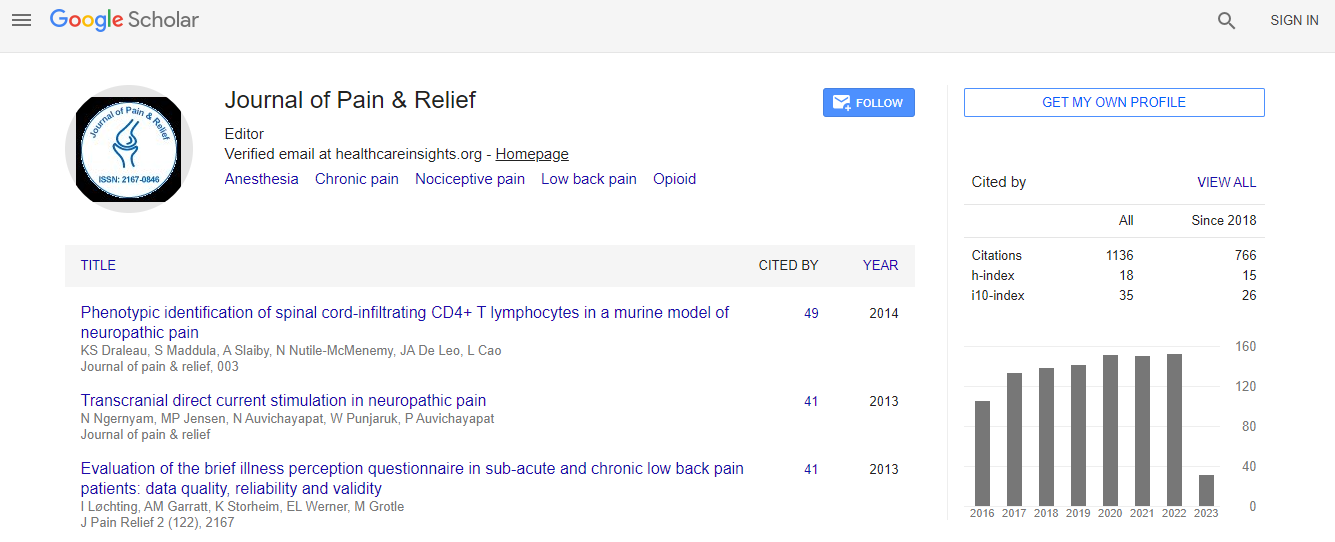Research Article
Personality, Anxiety, and Individual Variation in Psychophysiological Habituation and Sensitization to Painful Stimuli
| Yoshio Nakamura, Gary W Donaldson and Akiko Okifuji* | |
| Utah Center for Exploring Mind-Body Interactions (UCEMBI), Pain Research Center, Department of Anesthesiology, University of Utah School of Medicine, USA | |
| Corresponding Author : | Akiko Okifuji Pain Research Center Department of Anesthesiology University of Utah School of Medicine 615 Arapeen Drive, Suite 200 Salt Lake City, UT 84108 Tel: (801) 585-7690 E-mail: akiko.okifuji@hsc.utah.edu |
| Received August 22, 2014; Accepted September 15, 2014; Published September 17, 2014 | |
| Citation: Yoshio Nakamura, Gary W Donaldson, Akiko Okifuji (2014) Personality, Anxiety, and Individual Variation in Psychophysiological Habituation and Sensitization to Painful Stimuli. J Pain Relief 3:156. doi: 10.4172/2167-0846.1000156 | |
| Copyright:2014 Nakamura Y, et al. This is an open-access article distributed under the terms of the Creative Commons Attribution License, which permits unrestricted use, distribution, and reproduction in any medium, provided the original author and source are credited. | |
Abstract
Habituation and sensitization are two fundamental consequences in response to repeated painful stimulation. However, individual differences as to who systematically habituate versus sensitize are currently not well understood. Investigating changes in response modulation (habituation and sensitization) in laboratory subjects undergoing pain testing, we evaluated the hypotheses: 1) significant individual differences exist in patterns of habituation and sensitization, and 2) variations in response modulation are systematically associated with subjects’ characteristic personality styles. We explored personality and state predictors of individual differences in response modulation consisting of habituation and sensitization in pain-free, healthy subjects. We recruited 81 healthy subjects who underwent 36 trials of painful stimulations to their fingertips. Subjective pain reports and psychophysiological responses - evoked potential (EP) and skin conductance response (SCR) - served as measurement indicators for habituation and sensitization, and to evaluate how these different measures manifested in the group averages as well as in correlations across individuals. Results showed that although subjective pain report tended to indicate sensitization on average, both EP and SCR showed habituation. However, further analyses revealed that there was a positive convergence among the three channels across different subjects, suggesting that individuals tend to have consistent response styles in responding to repeated pain stimulations. Our analyses allowed us to make inferences about the relative proportions of individuals in the population who systematically habituate versus sensitize. Variations in the habituation-sensitization continuum are highly robust and systematic, and preexisting individual characteristics (personality and current psychological states such as state anxiety) in part accounted for these patterns.

 Spanish
Spanish  Chinese
Chinese  Russian
Russian  German
German  French
French  Japanese
Japanese  Portuguese
Portuguese  Hindi
Hindi 
